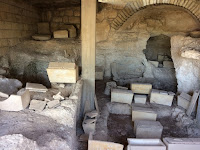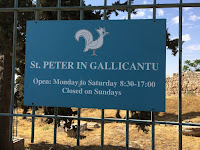A trial for the ages……and to placate the Jews. Pilate’s wife
warned him, “Do not do what they want you to do.” What did this ‘local’ matter
really have to do with Rome anyway. Except, of course, all matters had to do with Rome if it kept those under Roman rule from
becoming unruly.
The Jewish high priest, Caiaphas, had passed Jesus along to
Pilate. After all, the crowd screamed for Jesus’ blood, and after Jesus
answered an important theological question (“Are you the Son of God?”) by
denying them a denial but, rather, by quoting scripture at them, Caiaphas, and the
other priests, scribes, and all Jews with any interest in the status quo
screamed for Jesus’ death. The mighty Roman Empire alone, though, could
exercise state-sanctioned capital punishment. So, off to Pilate they went.
And Pilate’s wife shared her dream. “Have nothing to do with that Righteous Man.”
And why? Did she know something Pilate didn’t? Had the servants been talking?
No. Rather, “.....for last night I suffered greatly in a dream because of Him.” (All italics mine).
Pilate had such trust in his wife that, while he didn’t
believe the angry mob in front of him would allow him to just release Jesus, he
came up with what he believed an out for himself. He gave the crowd a choice.
Before Passover, Pilate traditionally released a prisoner. “I’ll release this man Jesus……or that no good
thieving, scoundrel Barabbas.” One of the Gospels called Barabbas “notorious.”
And the crowd cried, “Release Barabbas!”
“And what of Jesus?” You can almost hear Pilate’s voice
quiver. There was, after all, his wife with whom to contend. But, no hesitation
or softening of sound from the mob watching. “Crucify Him! Crucify Him!”
Pilate washed his hands. “I am innocent of this man’s blood!”
Oh, is it that easy to pass the buck? “I COULD stop this wrong…..but, on your
head be it.”
And the throng howled, “His blood will be on our heads,”
and, then, if already we do not wonder at their frenzy, if we are not shocked
at how lightly they toss aside the life of a Man from whom they had taken
teachings and miracles and bread and healing and love and life, hear the horde
bawl, “on our heads……and the heads of our children.”
I do not know, of course, we cannot know. But this Christ
who so loved children (“Do NOT stop little children from coming to me!” He had
commanded His disciples) must have felt His heart, already so broken and
battered from a night of betrayal and rejection from people He had loved so
fiercely at the cry for the curse falling onto innocents—people so consumed
with hatred of a blameless man, the Son of God, that they easily and gladly
passed blame to their children, must have felt the break in His heart grow even bigger.
 |
Some of the Caves from
Sign above |
Pilate, then, having whipped Jesus earlier, handed Him over.
In such caverns as shown here, the Roman soldiers—egged on, helped?, by the
frenzied Jews—stripped Jesus, put on him a royal purple robe to mock that title
“King of the Jews.” Taking a plant like
a vine of thorns, they constructed an artificial crown and rammed it on his
head, blood now coursing into his eyes, so much
 |
| Caves from Sign Above |
so that they thought beating
Him about the head would make some kind of point, all reason well gone by this
time.
And, finally, Jesus carried the cross bar of His crucifixion
down that Via Delarosa—“The Way of Suffering”—the traditional path He walked
out Jerusalem to Golgotha, “The Place of the Skull.” The picture of that spot
here was taken in the 1960’s. In that picture, a skull can still emerge from
the hillside as you look, though certainly blurred after 2000 years of elemental
wear. Imagine the reality of that skull face looking out on the road in the
First Century. In the 21st Century, the face on the hill has faded
away, or I could find no outline of it. But that place still stands there, a
reminder of that Friday afternoon, of that one particular, significant
execution.
 |
Calvary, 1960's
"Place of the Skull" |
The beautiful paintings show Jesus high up on a hill, His
cross above those of the two men crucified with Him. Probably, though, the men
were nailed to crosses on the road, visible to all who walked within sight of
that Skull Hill and those three dying men. “Let this be a warning…..Mighty Rome
could do this to you as well……..” No beauty in that scene.
Watching along the road, Mary, Jesus’ mother. How did she
bear it?
The soldiers whose job it was to carry out this execution
mixed with sightseers. Public executions happened in all kinds of cultures word
wide until recently, it seems.
Other followers of Jesus watched their dreams fade as His
blood drained down that cross, down a hill, down the road. We know John, that
youngest of the disciples, watched with Mary, Jesus’ mother.
Even then, Jesus saw to the needs of those around Him. His
beloved mother now would live with that young disciple, John. If, as
Protestants believe (and I am a Protestant) Mary and Joseph had other children
after Jesus, He did not trust the care of his beloved mother to them.
Jesus also looked to His side, to a thief being crucified at
the same time as Him, one who recognized the difference of Jesus and other men…..”Today,
you and me, in Paradise.”
What a wealth in that sentence.
And then, from that despicable, appalling, shameful, vile
cross, the Son of God cried, “It is finished!” Even now, we do not understand
completely all the work completed on that cross.
And from a Roman soldier, “Surely this was the Son of God.”
Such was the impact of His death.
I wonder, as Jesus’ spirit left His poor, broken, scarred
body, I wonder if angels in Heaven heaved sighs. “Finally!” What did Heaven
look like that day when Jesus and the thief from the other cross met again—Jesus’
promise kept. “Today, you and me, Paradise.”
I wonder how God the Father held back the archangel Michael,
that mighty warrior, from coming to wreak havoc and revenge on those mere
humans who had so wickedly handled the body of the Son of God……..
 |
A First Century Tomb
with Ossuaries |
Because they wanted to bury the body, not for altruistic
reasons, but to be sure it was buried
and so that no one could say anything crazy like, oh, Jesus had risen from the
dead, the Jewish leaders made absolutely sure Jesus was dead on that
cross. Then, a wealthy follower, Joseph
of Arimathea, provided a nice grave—much nicer than anyone in Jesus’ earthly
family could have given. They prepared
the body as best they could in the time they had—Sabbath began at sundown—put Him
in that cave, rolled a huge stone in front of it, a stone like a big disk
pushed along a small gulley in front just for that purpose, persuaded Rome to position guards, and went away
satisfied their work was
done, complete.
If they only knew.
The disciples and followers of Christ went away….to hide, to
pray, to cry, to grieve. He had told them, but who could understand what He truly
meant by “resurrection”? By “be not afraid?” All their dreams and hopes for
overthrowing Rome, all their aspirations for helping Jesus rule over their
hated enemies. They went away, some together, some alone, as their world fell
apart……
If they only knew.
 |
| Calvary Today |
















